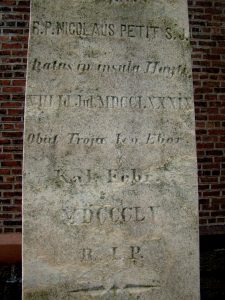On this first day of February, we mark 162 years since the death of Nicholas Louis Petit S.J. It probably means very little to most people, but being serious about”Keeping the memory alive of those who have gone before us” for me, also means”keeping track” of them as well.
I’ve written previously about Father Petit S.J. the Jesuit who was born in Haiti, served on the faculty at Saint Mary’s College in Kentucky, as well as at the Cathedral in Vincnennes, and the man who was Bishop Simon Brute’s first choice to succeed him as Bishop of Vincennes.
The Superior General of the Society of Jesus stubbornly refused to allow Fr. Petit to be considered for Coadjutor of Vincennes. His reasoning had much to do with the shortages of Jesuits.
Gilbert Garraghan wrote:
Bishop Brute of Vincennes made repeated efforts to obtain a Jesuit for his coadjutor, having proposed to Rome in this connection the name of Father Nicholas Petit of St Mary’s College, Kentucky.”I give up,” he wrote to Father Roothaan, [The Jesuit Superior]”my prolonged and useless efforts to obtain a coadjutor from your Society” 1
Garraghan writes further …
Bishop Rosati, of Saint Louis, in seconding Brutés petition to have Father Petit for his coadjutor, had written as follows to Propaganda…
“Reverend Father Louis [Nicholas] Petit, who is mentioned first, I consider worthiest to be chosen,in preference to the others for the office of coadjutor-bishop of the Bishop of Vincennes; for he excels in piety, learning, eloquence, knowledge of the English and French languages, as also in administrative ability. To all the faithful of that same diocese, to whom he is by no means unknown, having conducted missions among them, he would beyond doubt be highly acceptable. Besides, that he has professed the religious life in the Society of , Jesus, that he is of the utmost utility and even necessity to the Kentucky Mission of the Society of Jesus, in which he is now living, that the rules of the Society do not allow of the promotion of its members to the episcopate, these circumstances, so your Eminence will judge, do not in any manner stand in the way of his election.Fr. Petit’s grave in the church yard of St. Joseph, Troy, N.Y. A loose translation would be: Nicolaus Petit S.J. Born in Haiti (Hayti) 8 July 1789 ““ Died 1 February 1855. 2
… Is it such a mighty task to keep intact the Society of Jesus that, lest one or other of its members be raised to the episcopal dignity, the American churches must pine away for lack of pastors and grow old in their very youth? Are not the Religious Orders and Societies members of the Universal Church? Ought they not on occasion make a sacrifice of their private advantage for the common good of the Church? In fine, have they anything to fear from the promotion of their priests to American churches, which have nothing to offer to the cupidity of man? Not wealth, not honors, not leisure. Not even Ignatius himself, who as long as he lived was aflame with the most ardent zeal for the salvation of souls, the glory of God and the expansion of the Church, would in the condition of things that besets us today be opposed to his followers not merely lending but even spontaneously offering themselves to meet the needs of our churches. If there were available other priests of the secular clergy fitted for a burden that is formidable even for angelic shoulders, the worthy sons of Ignatius would indeed be left in peace.” 3
That appointment was obviously never to be. Fr. Petit went to New York after the Jesuits gave up St. Mary’s in Kentucky, and eventually he ended up in St. Joseph’s Parish in Troy, New York. It was there that he died of February 1, 1855. He was buried in the church yard. That burial place was virtually unknown until now.
You can read the entire exchange with the Jesuit Superior et al, which appeared in “Woodstock Letters in 1902.
- Garraghan, Gilbert J. 1938. The Jesuits of the middle United States. Vol-2, New York: America Press. p.118 [↩]
- The photo of Fr. Petit’s stone – thanks to Deacon Charles Wojton of St. Joseph’s Parish, Troy, New York[↩]
- Ibid. Cf. also Sister Mary Salesia Godecker, O.S.B., Simon Brute de Remur, First Bishop of Vincennes (St. Meinrad, Indiana, 1931), p. 336 et seq.[↩]
